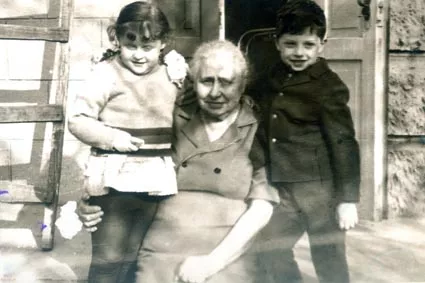This photo shows my husband’s aunt and her grandchildren. I remember that her granddaughter’s name was Sofa. The photograph was taken in Odessa and I do not know who took it.
I got acquainted with my husband Mikhail Borukhzon at our College (he was 2 years older than me). He was born in 1914 in Ukraine (in Varnavitsi shtetl). Later his parents together with him moved to Vinnitsa [a town in Ukraine]. His father's name was Akiva, and I do not remember his mother's name. In Vinnitsa he finished a Jewish technical school, where he studied Yiddish. He knew Yiddish very well and considered it to be his mother tongue. We got married after graduation from the College, in 1939. I worked at the PROMTRANSPROEKT institution [a designing organization for transport industry]. In 1940 my Mom died. Our elder daughter Mara was born in 1941. In summer of 1941 we rented dacha near Tosno [a suburb of St. Petersburg]. At that time Daddy worked in Tosno, and my husband worked in Kolpino. War burst out when my elder daughter was about 5 months old. We left almost everything and managed to escape before Germans occupied Tosno. We went to evacuation with my sister (she was 13 at that time), my baby daughter and my Daddy.
Members of our family started their way back home (to Leningrad) in 1948. Serafima went first. She settled at my aunt Liya in Belinsky Street. She entered the Leningrad College of Foreign Languages, which was situated in Smolny [Smolny is a complex of buildings in St. Petersburg used as a residence of the city administration]. I remember that at that time we sent her potatoes from Sverdlovsk. Daddy was the next one to leave for Leningrad. He found out that our apartment was occupied by some people, but he managed to evict one room from its unlawful possessor. So we returned to Leningrad to that room. My husband remained in Sverdlovsk for some time, but at last they called him back to Leningrad.
So among my relatives only aunt Rachel was killed because of her nationality. Among my husband's relatives we lost his parents and his sister (her name was Rachel, too). They lived in a small town Shpikov [in Ukraine]. In the beginning of the war they were ready to leave, but Germans got them off the train. It happened probably in 1942. We got to know about it only in Sverdlovsk: we received a letter. I read it and hid: I was afraid to show it to my husband. Later he found it by chance and cursed me out for my silence. Several years later we (together with my children) visited cemetery in Shpikov: there we found common graves and a monument. In Shpikov my husband's cousin lived with her family and we often visited her in summer before the war burst out.


























